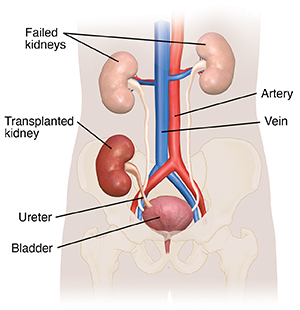Understanding Kidney Transplant
A kidney transplant is a surgery to put a donated kidney into your body. It is the preferred treatment for kidney failure. The new kidney takes over the job of filtering your blood.
Finding a new kidney
The new kidney may come from:
Living donor kidney
Living donor kidneys work much longer than deceased donor kidneys. For this reason, you are strongly encouraged to talk with your friends and family. But the donor does not have to be related to you. Their kidney must match your blood type and immune system. A person can safely donate a kidney if they are in good health and pass all the medical tests.
Deceased donor kidney
For this, permission is needed from the donor's family. There is a waiting list for kidneys from deceased donors. The list ranges from months to years. This depends on your blood type.
Preparing for surgery
-
You must have a series of tests in the transplant center. These are done to make sure you are eligible for transplant. Tests are done to make sure you don't have any serious infections. These include AIDS and hepatitis B.
-
Your vital organs need to be working well. This includes your heart and lungs. They must be able to endure the surgery and the antirejection medicine (see below).
-
A social worker will talk with you. They will ask about your financial situation and social support.
-
Your healthcare provider will explain your roles and responsibilities with the new kidney. Your commitment is important. You will need to keep the kidney healthy and working for a long time.
-
Your healthcare provider will talk with you about the possible complications of surgery. They will talk about the side effects of the medicines you will need to take after transplant.
-
Tests are done to make sure that the donor kidney matches your body's blood type and immune system. This can prevent a sudden rejection after the transplant.
During the transplant surgery
-
The surgery usually takes about 3 to 6 hours.
-
All kidneys are screened for disease before the transplant.
-
In most cases, your kidneys will not be removed. This is because even failed kidneys release chemicals that help your body work.
-
The new kidney is placed in the lower part of your belly (abdomen) near your groin.
-
It is attached to nearby blood vessels. Blood can then flow through to be filtered.
-
The ureter is connected to your bladder to let urine flow out.

Recovering from surgery
You will recover in the hospital after surgery. A living donor may stay in the hospital for up to a week. You may stay longer. Your new kidney may start to work right away, especially if it's from a living donor. Or it may take a few weeks if it's from a deceased donor. You will be told what to do and not to do while you’re healing.
Taking antirejection medicine
Your body's immune system will try to damage the new kidney right after the surgery. This is called acute rejection. Taking antirejection medicines right after the surgery can stop this. You will need these for the rest of your life as long as your kidney is working. This is to keep your body from rejecting the transplanted kidney. Your healthcare team will discuss the side effects of these medicines with you.
You will need to watch your health for signs of kidney rejection. These include:
Notes for a donor
Here are some things to know before donating a kidney:
-
You can only donate if your blood type is compatible with the recipient's blood type. Other types of matching will also be done. You may need to stay in the hospital for 24 to 48 hours to have tests.
-
You will be given a full medical checkup. This is to make sure you are healthy enough to donate.
-
Your kidney is usually removed by a laparoscopic method. This uses a few small incisions. In some cases, an open procedure is used. This is done with a longer incision. Recovery time is longer after an open procedure.
-
You have 2 kidneys. When you have 1 kidney removed, your other kidney will take over and keep you healthy. Talk with your provider about the possible complications of surgery.
-
Some of the costs of donating a kidney are covered by the recipient's insurance. Talk with the social worker to get all cost and insurance information.
The need for kidneys to transplant continues to increase. If you want to donate a kidney when you die, go to www.organdonor.gov. You can also learn more at www.transplantliving.org.